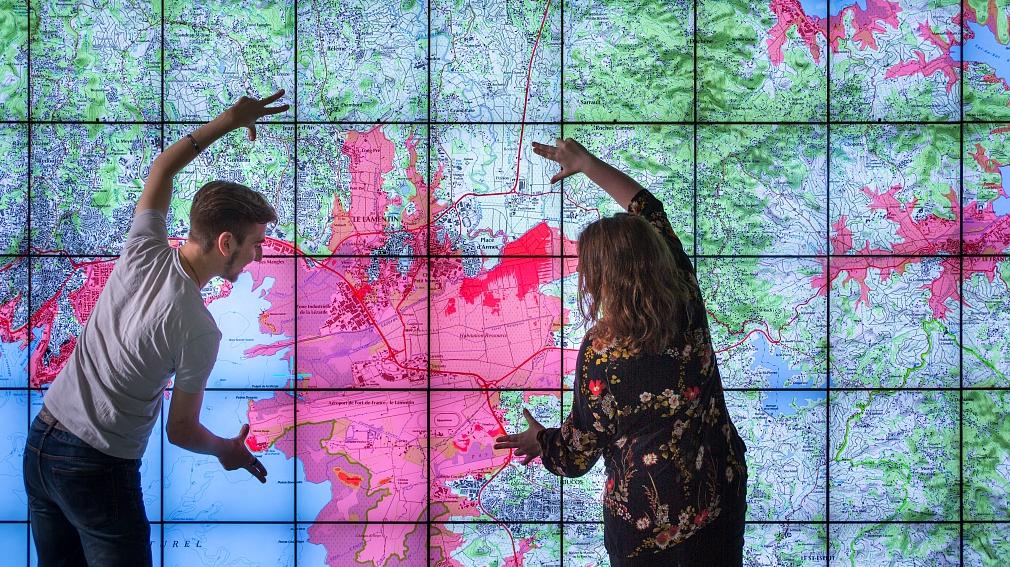With digital technology disrupting all established frameworks, in order to bring through ambitious scientific and entrepreneurial projects, Inria's responsibility is to create value on a large scale for society and for the economy; to raise France’s profile and boost its attractiveness; and to increase the impact of research and innovation in the digital sector.
Exploring new avenues
Risky research has to be able to produce scientific results that will make a significant contribution to the digital society: furthering knowledge and perhaps inventing new disciplines in which digital technology will play a formative role.
Inria needs to build new fields of research and to explore new avenues, such as:
- Disruptive research, in areas where the applications are not necessarily known in advance
- New scientific problems, renewed research themes and original avenues for scientific exploration into key subjects such as cybersecurity, responsible AI and applications for health and energy
- New frontiers in the context of the environment, energy, transport, agriculture and the humanities
- Interdisciplinarity and the hybridisation of skills between digital sciences and other disciplines, including humanities, particularly with regard to questions of digital trust, privacy or the loyalty of algorithms.
What are Inria Challenges?
Inria Challenges (formerly IPL) are used to launch ambitious research projects that are directly linked to the institute’s strategic plan and the benchmarks it contains. Often multidisciplinary, these challenges incorporate a range of different skills, the goal being to showcase the expertise of Inria researchers in relation to important challenges.
Inria Challenges operate as inter-team project teams. These are evaluated by their peers - generally experts from other countries - and run for a period of four years. Coordinated by a scientific leader, Inria Challenges are each structured around a given research subject, with a programme and clearly defined objectives. They bring together “grey matter” resources from different Inria project teams, in addition to external partners from the worlds of industry and academia.
These Challenges are used to develop a structure around major research subjects on which the institute is looking to place particular emphasis. They are launched in small numbers, with substantial resources allocated, and proposals put forward by directors of research. A first assessment will take place at the halfway stage, with a second, outlining the results obtained, taking place at the end of the project.
Current Challenges
AVATAR : The next generation of our virtual selves in digital worlds
Project-teams: GraphDECO, HYBRID, MIMETIC, MORPHEO, POTIOC, LOKI
BetterNet : An Observatory to Measure and Improve Internet Service Access from User Experience
Project-teams: DIANA, DIONYSOS, Inria Chile, MADYNESS, MUSE, SPIRALS
Partenaires : ENS-ERST, ip-label
COSY : COntrôle en temps réel de communautés microbiennes SYnthétiques
Project-teams: Ibis, Biocore, Lifeware, Non-A
DISCOVERY : DIstributed and COoperative management of Virtual Environments autonomousLY
Project-teams: ASAP, ASCOLA, AVALON, MYRIADS, KERDATA
HAC SPECIS : High-performance Application and Computers, Studying PErformance and Correctness In Simulation
Project-teams: AVALON, HIEPACS, MEXICO, MYRIADS, SUMO, VERIDIS, POLARIS, STORM
HPC-BigData : High Performance Computing and Big Data
Project-teams: DATAMOVE, KERDATA, SEQUEL, ZENITH, PARIETAL, TADAAM, HIEPACS, STORM, REALOPT, SIERRA, TAU
HyAIAI : Hybrid Approaches for Interpretable AI
Project-teams: ACODAM, MAGNET, MULTISPEECH, ORPAILLEUR, SEQUEL, TAU
ICODA : Data Journalism : knowledge-mediated Content and Data Interactive Analytics
Project-teams:: GRAPHIK, ILDA, LINKMEDIA, CEDAR
ModeliScale : Languages and compilation for Cyber-Physical System Design
Project-teams: BIPOP, HYCOMES, PARKAS
Partenaires : École polytechnique (LIX, équipe Cosynus), CNRS / Centrale-Supélec (L2S), Université Grenoble-Alpes (Verimag, équipe Tempo)
Naviscope : Navigation et visualisation guidées par l'image de corpus de données en imagerie cellulaire et microscopie
Project-teams: AVIZ, BEAGLE, HYBRID, MORPHEME, PARIETAL, SERPICO, MOSAIC
Neuromarkers : Conception de biomarqueurs d'imagerie des maladies neurodégénératives pour les essais cliniques et étude de leurs associations génétiques
Project-teams: ARAMIS, BONSAI, DYLISS, GENSCALE, XPOP
Partenaires : ICM (Institut du cerveau et de la moelle épinière, www.icm-institute.org)
RIOT-FP : Reconcile IoT & Future-Proof Security
Project-teams: EVA, GRACE, INFINE, PROSECCO, TEA
SPAI : Security by Program Analysis of the IoT
Project-teams: ANTIQUE, CELTIQUE, INDES, PRIVATICS, KAIROS
SURF : Sea Uncertainty Representation and Forecast
Project-teams: AIRSEA, FLUMINANCE, CARDAMON, ANGE, LEMON, DEFI, MINGUS
ZEP : Zero-Power computing systems
Project-teams: ALF, CAIRN, CORSE, SOCRATE

